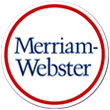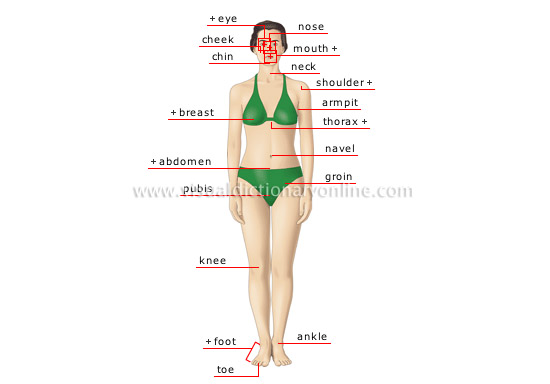anterior view
nose 
Mid-facial protuberance having two orifices (nostrils); it has an olfactory and respiratory function.
mouth 
Anterior cavity of the digestive tract bounded by the lips; it enables the digestion of food, among other functions.
chin 
Protruding portion of the face that varies in shape; it corresponds to the lower jawbone.
shoulder 
Upper limb joint articulating with the thorax; extremely mobile, the shoulder is capable of a wide range of movements.
armpit 
Depression located beneath the shoulder between the arm and the thorax and covered with hair at puberty.
thorax 
Bony cage making up the upper portion of the trunk; it contains the major respiratory and circulatory organs (lungs, heart).
abdomen 
Soft part forming the lower portion of the trunk and containing various organs of the digestive, urinary and reproductive systems.
groin 
Depression resulting from the juncture of the lower abdomen and the thigh.
ankle 
Joint of the foot articulating with the leg, forming internal (tibia) and external (ulna) lateral protuberances.
toe 
Each of the five terminal parts of the foot formed of various articulated bones and ending in a nail.
knee 
Joint that articutes the thighbone (femur) with the lower section of the leg (tibia).
pubis 
Triangular protuberance of the lower abdomen; it is covered with hair at puberty.
navel 
Scar in the shape of a small round depression, the result of severing the umbilical cord that connected the fetus to the mother.
breast 
Female milk-secreting glandular organ; it develops at puberty and increases in size during pregnancy.
neck 
Portion of the body connecting the head to the trunk; the respiratory tract, nerve centers and blood vessels, in particular, pass through it.
cheek 
Lateral portion of the face containing muscles capable of producing many different expressions.
eye 
Organ of sight used to make out shapes, distances, colors and movements; the human being is endowed with good eyesight.













